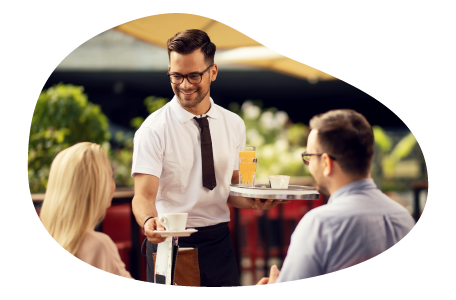
General liability insurance for food and beverage businesses
General liability insurance covers common food and beverage business risks like customer injuries, property damage, and advertising injuries. It also protects your food and beverage company from the financial loss that comes with lawsuits and helps you qualify for leases and contracts.
General liability protects against common risks
General liability insurance is often the first policy that food and beverage business owners purchase.
It provides protection against common third-party lawsuits and accidents that might otherwise financially devastate your business. It is also required for most restaurant commercial leases.
More specifically, a general liability policy helps provide coverage for:
- Customer injuries
- Customer property damage
- Host liquor liability
- Advertising injuries, such as slander, libel, and copyright infringement
Bundle policies for better, more affordable protection
If your restaurant, bakery, or other food business is relatively small and low-risk, you may be eligible to bundle general liability insurance with commercial property insurance in a business owner's policy (BOP), which costs less than purchasing each policy separately.
For greater protection, you can also add endorsements to your general liability policy or BOP, such as:
- Liquor liability insurance
- Business interruption insurance
- Cyber insurance
- Food contamination and spoilage insurance
Bars and other businesses that serve alcohol may need liquor liability insurance to meet state requirements or to obtain a liquor license.
Start a free online application with Insureon to get free quotes, or contact a licensed insurance agent if you need help finding the right insurance options.

What coverage can general liability provide for food and beverage businesses?
A general liability policy protects your food and beverage business from common third-party liability risks.
This includes:
Customer injuries
Accidents can happen at any food or beverage business. When a customer gets hurt on your business premises, general liability insurance can pay for everything from an ambulance ride to attorney's fees if your business is sued.
More specifically, general liability insurance covers:
- Legal defense fees
- Medical expenses
- Court-ordered judgments
- Funeral expenses in fatal incidents
- Food poisoning claims through product liability insurance (often included in general liability coverage)
Although general liability insurance covers food poisoning claims, it won't protect against the cost of replacing spoiled perishable goods. For that, look to food contamination and spoilage insurance. This coverage can be added to your property insurance policy or BOP.
In addition, a general liability policy does not protect your employees if they get injured on the job. For that, you’ll need workers’ compensation insurance.
Customer property damage
General liability insurance also protects your business if customer property is damaged. For example, if a server spills a drink on a customer’s laptop and damages it, your general liability policy would help pay for:
- Legal fees if you are sued
- The cost of replacing the laptop
- An out-of-court settlement
General liability insurance can also protect your food service business from off-site incidents, though you may need to add an endorsement. For example, if your business caters a corporate reception and your food-warming equipment starts a fire, any resulting lawsuits alleging property damage would be covered by your policy.
Host liquor liability
Though it won’t cover incidents at a bar or restaurant that regularly serves alcohol, general liability insurance includes host liquor liability insurance.
This type of insurance policy covers bodily injury and property damage resulting from alcohol served at a social function. This may include a company party where you provide alcohol, or other events unrelated to your business’s profits.
Advertising injuries
You may think your restaurant’s advertising is unique, but it's possible to inadvertently copy a competitor’s slogan or logo. Accidental advertising injuries are covered by general liability insurance.
This includes:
- Copyright infringement
- Defamation, both libel (written) and slander (spoken)
If you use advertising or promotional materials to attract customers to your food service business, you’ll want to make sure your general liability insurance coverage includes this protection.
How much does general liability insurance for food businesses cost?

Food and beverage business owners pay an average of $44 per month, or $525 per year, for general liability insurance.
Insurance costs for food and beverage businesses are based on a few factors, including:
- Type of food and beverage business
- Business equipment and property
- Revenue
- Location
- Number of employees
Other policies for food and beverage businesses to consider
General liability insurance covers common risks faced by every small business, such as customer injury or food poisoning claims via product liability insurance. However, it does not provide complete protection.
Owners of food and beverage businesses should also consider:
Business owner's policy: A BOP bundles general liability coverage with commercial property insurance at a discount. It includes coverage for fires, theft, and other losses. You can add endorsements to this policy, such as food contamination and spoilage coverage.
Workers’ compensation insurance: Workers' comp is required in most states for businesses with employees. It can cover medical expenses and partial lost wages if an employee is injured on the job.
Commercial auto insurance: Required in most states, commercial auto insurance covers vehicles owned by your business. It can pay for injuries and property damage in an accident, along with vehicle theft, weather damage, and vandalism.
Liquor liability insurance: This policy covers risks involved with serving alcohol, such as an intoxicated customer breaking another customer’s property or causing an injury.
Cyber insurance: A cyber insurance policy helps food and beverage businesses recover financially from data breaches and cyberattacks. It covers customer notification costs, cyberextortion payments, and other expenses related to a cyber incident.
Get free general liability insurance quotes and buy online with Insureon
Are you ready to safeguard your food service business with general liability insurance?
Complete Insureon’s easy online application to compare quotes from top U.S. insurance companies. A licensed insurance agent is available to discuss business insurance costs and answer all of your questions.
Once you find the food and beverage insurance policies that fit your unique business needs and budget, you can begin coverage and get a certificate of insurance in less than 24 hours.

























